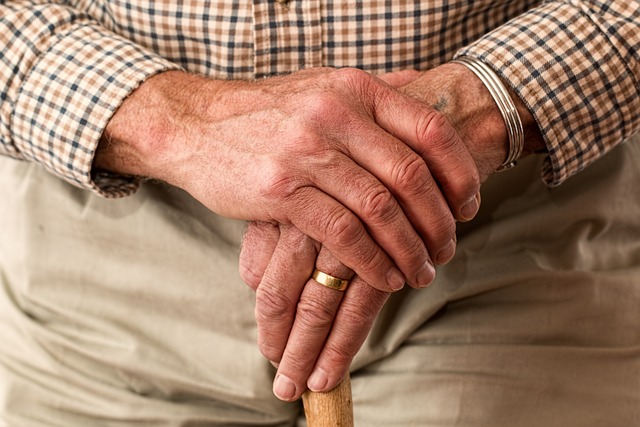Elderly Companion Services are revolutionizing medication management for seniors by incorporating smart technology that aligns with healthcare providers' schedules, ensuring accurate timing and dosage administration. These services feature smart pill dispensers and automated reminders, along with sensors and alerts to monitor medication adherence in real-time, preventing potential overdose or under-medication. They also facilitate telehealth features for remote health monitoring by professionals, which can lead to improved health outcomes and decreased hospital readmissions. The technology is tailored to individual needs, including cognitive abilities and visual impairments, and employs voice interaction with a human touch for better understanding and engagement. The user interface is designed for clarity and ease of use, catering specifically to the elderly population. These Elderly Companion Services not only assist with medication schedules but also promote security and autonomy, enriching the lives of seniors by providing companionship and support with daily tasks. Their adaptability and focus on user experience make them an essential component in addressing the healthcare challenges of the aging population, enabling older adults to maintain health independence at home with greater confidence.
Navigating medication management can be a complex task for seniors, often necessitating additional support to maintain health and independence. This article explores the transformative impact of elderly companion services in providing tailored medication reminders. By leveraging technology, these services offer customized solutions that align with individual preferences and needs, thereby improving adherence to prescribed treatments. Discover how companion services are enhancing seniors’ quality of life through personalized medication prompts, ensuring they live healthier and more autonomous lives.
- Leveraging Technology for Medication Management: The Role of Elderly Companion Services
- Customizing Medication Reminder Systems to Suit Senior Needs and Preferences
- Enhancing Seniors' Health and Independence with Tailored Medication Prompts from Companion Services
Leveraging Technology for Medication Management: The Role of Elderly Companion Services

Elderly companion services are increasingly integrating advanced technology to assist seniors with their medication management, addressing a critical need for this demographic. These services leverage smart pill dispensers and automated medication reminders that sync with healthcare providers’ schedules, ensuring that medications are taken at the correct times and dosages. By incorporating sensors and alerts, these systems not only prompt the user but also notify caregivers or family members if a dose is missed, providing a safety net against unintentional overdose or under-medication. The benefits of such technology extend beyond individual adherence; they facilitate better health outcomes by reducing hospital readmissions and enabling a more autonomous lifestyle for seniors who might otherwise depend on others for their medication schedules.
Furthermore, elderly companion services often include telehealth features that allow healthcare professionals to monitor patients remotely. This remote monitoring capability not only supports adherence to medication regimens but also offers the opportunity for real-time health assessments and interventions when necessary. The integration of these technologies within elderly companion services represents a significant advancement in care, ensuring that seniors receive personalized attention tailored to their unique needs, thereby enhancing their quality of life and independence.
Customizing Medication Reminder Systems to Suit Senior Needs and Preferences

Customizing medication reminder systems for seniors is pivotal to ensure adherence and maintain their health and well-being. These systems can be tailored to meet individual needs, accounting for factors such as cognitive abilities, visual impairments, and personal routines. Elderly companion services often integrate advanced technology with human interaction, providing a compassionate presence that goes beyond mere alerts. By incorporating voice commands or reminders from a familiar and empathetic voice, these systems can enhance comprehension and engagement. Additionally, the customization extends to the device’s interface, with clear and legible fonts, high-contrast colors, and easy-to-navigate software designed specifically for older adults. This personalized approach not only helps in managing medication schedules but also fosters a sense of security and independence, allowing seniors to live more fulfilling lives.
Furthermore, the integration of elderly companion services with medication reminder systems offers a comprehensive solution that goes beyond simple reminders. These services can monitor medication intake, alert caregivers or family members in case of missed doses, and even provide educational content to increase medication literacy. This holistic approach ensures that seniors receive support that is both responsive to their immediate needs and proactive in addressing potential future challenges. By leveraging the expertise of eldercare professionals and incorporating user feedback, these systems can evolve, continuously improving to meet the diverse requirements of the aging population.
Enhancing Seniors' Health and Independence with Tailored Medication Prompts from Companion Services

The integration of companion services into the daily lives of seniors has proven to be a pivotal step in maintaining their health and promoting independence, particularly when it comes to managing medication schedules. These personalized companion services are designed to support the elderly by providing tailored medication prompts, ensuring that they adhere to their treatment plans without feeling overwhelmed or neglected. With the use of sophisticated reminders, these services can alert seniors at specific times for dosage adherence, taking into account the complexities of multiple medications and varying schedules. This proactive approach not only reduces the risk of missed doses but also empowers seniors to manage their health with greater autonomy. Moreover, companion services often include trained professionals who can offer companionship, assistance with daily tasks, and a reassuring presence, thereby creating a comprehensive support system that goes beyond mere medication management. This holistic approach to care is instrumental in enhancing the overall well-being of seniors, enabling them to continue living independently and confidently in their own homes.
In conclusion, the integration of elderly companion services represents a significant advancement in supporting seniors with their medication management. By customizing medication reminder systems to align with individual preferences and needs, these services not only enhance health outcomes but also bolster independence among older adults. The utilization of technology within companion services ensures that this vulnerable demographic receives timely and appropriate prompts for their medication schedules, thereby promoting a safer and more autonomous lifestyle. As the population continues to age, the role of such tailored assistance becomes increasingly crucial in safeguarding the well-being of seniors. Elderly companion services stand as a testament to the power of technology when harnessed with compassion and care, offering a reliable ally for the elderly in managing their health needs.
